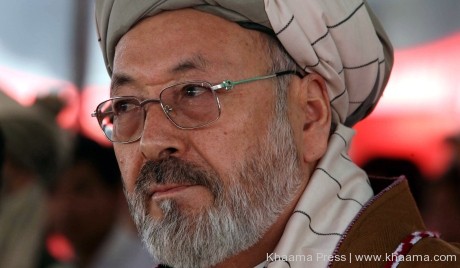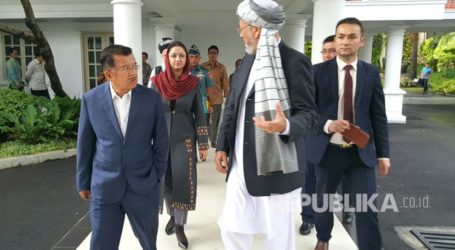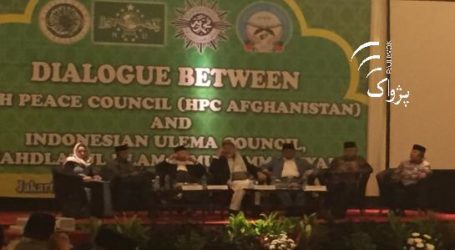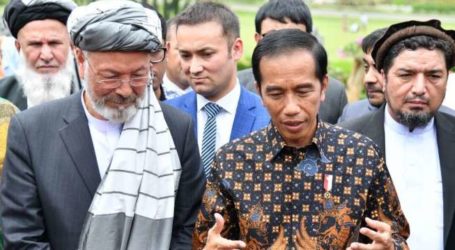Jakarta to Share Its Experiences With HPC Chief


The Chairman Afghanistan’s High Peace Council (HPC) Mohammad Karim Khalili is in Indonesia where he will hold discussions with high-ranking Indonesian officials including President Joko Widodo.
The Indonesian embassy in Kabul has said that the trip, from November 19 to 25, by the HPC delegates comes as part of the follow up meeting between President Ashraf Ghani and his Indonesian counterpart Widodo.
“The purpose of the visit is to have exchange of views and share lessons learnt, and reinforce both countries’ experience dealing with peace process, reconciliation efforts and reintegration mechanism. Indonesia could share its experiences dealing with armed conflict, such as in Aceh Province, and communal conflict such as in Ambon, Moluccas Province,” tolonews.com reported, citing a press release issued by the Indonesian embassy in Kabul.
The press release states that Indonesia as the world’s most populous Muslim nation has a deep-rooted historical friendship with Afghanistan and that Indonesia remains committed to supporting Afghanistan in its peace and reconciliation process.
On November 6, Indonesia’s Foreign Affairs Minister Retno L.P Marsudi met with Ghani in Kabul where the two sides pledged to further enhance bilateral ties in all spheres between the two countries.
At the meeting, Ghani also stressed the need for closer ties between religious scholars from the two Muslim nations.
In addition, Ghani expressed his gratitude over what he described as Indonesia’s support and cooperation with Afghanistan and said Indonesia has great expertise in a number of fields involving economic development and women empowerment, adding that his government hopes that Indonesia shares these skills with Afghanistan.
Meanwhile, the HPC’s visit comes at a time that the peace and reconciliation process between Afghanistan’s government and the Taliban has stalled – with no sign of a breakthrough in sight.
Back in October, representatives from more than 50 countries and international organizations attended the International Contact Group’s meeting in Moscow where they discussed the issues around the Afghan peace process and the peace talks with the Taliban.
Similar rounds of peace talks meetings were also held in Islamabad including several rounds of Quadrilateral Coordination Group (QCG) which is held between representatives from Afghanistan, Pakistan, the United States, and China. However none of the meetings yielded positive results regarding peace.
In an attempt to revive the peace process between the Afghan government and the Taliban, the first meeting of the Afghanistan-Pakistan-United States-China Quadrilateral Coordination Group (QCG) was held in the Pakistani capital Islamabad on January 11 last year.
The group included Afghan Deputy Foreign Minister Hekmat Khalil Karzai, Pakistan’s Foreign Secretary Aizaz Ahmad Chaudhry, US Special Representative for Afghanistan and Pakistan Ambassador Richard G. Olson and China’s Special Envoy for Afghanistan Ambassador Deng Xijun.
But Afghan officials have constantly blamed Pakistan for doing nothing to persuade the Taliban group to endorse purposeful peace negotiation talks with the Afghan government. But Pakistan insists that it was doing enough to secure Afghanistan.
This latest visit also comes amid the Taliban’s ramped up war efforts against the Afghan security and defense forces across the country. As a result civilian casualties have been on the rise in the war-ravaged nation.
Civilian toll on rise
A recent report by the United Nations indicates that 8,019 civilians including women and children were killed and wounded in the Afghan conflict in the first nine months of this year.
The report also says anti-government armed groups are responsible for the 64 percent of the casualties while the Afghan government affiliated forces are responsible for 20 percent of the civilian deaths.
The report shows that civilian casualties in airstrikes have increased by 50 percent during the past nine months.
According to the report, 2,640 civilians were killed and 5,379 others were wounded as a result of violence, conflicts and airstrikes. (T/RS5/RS!)
Mi’raj Islamic News Agency (MINA)






